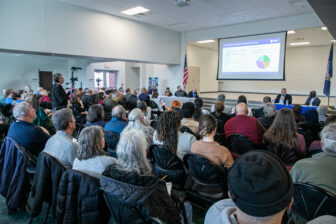Hundreds of landowners, businesses, faith leaders and community organizations who have spent three years fighting the proposed fracked-gas Mountain Valley Pipeline (MVP) are vowing to continue pressing federal, state, and local officials to reject the project, notwithstanding a certificate issued by the Federal Energy Regulatory Commission late Friday.
The agency has utterly failed to account for the harmful impacts to water resources, private property, local economies and the climate from the proposed pipeline, the groups say. In fact, FERC has yet to competently assess whether the pipeline is even needed.
“This project is far from a done deal. With the Virginia Department of Environmental Quality and other agency permitting still necessary, we’ve now begun a new phase of our challenge in protecting our waters, farms and businesses, and our future,” said Roanoke County resident Roberta Bondurant of POWHR, a bi-state coalition of community groups along the path of the proposed Mountain Valley Pipeline.
The pipeline, proposed by a consortium of natural gas companies led by Equitrans, would run 300 miles from Wetzel County, West Virginia, through Southwest Virginia and connect with the existing Transco line in Pittsylvania County. It would cross streams, wetlands and other water bodies more than 1,000 times in the two states, many of those in extremely steep mountain terrain susceptible to earthquakes and landslides.
The project still requires numerous local, state and federal sign-offs. Importantly, both Virginia DEQ and West Virginia DEP must still certify that the project would not harm or degrade water resources. West Virginia issued its certification earlier this year, but recently asked the court to remand the permit back to the state for further consideration after a challenge brought by Appalachian Mountain Advocates on behalf of several community groups. The Virginia Department of Environmental Quality is now reviewing tens of thousands of public comments on its draft water quality certificate.
The U.S. Forest Service, the Corps of Engineers, U.S. Fish and Wildlife Service, Virginia Marine Resources Commission, and state and local health and zoning departments are among the other government entities that still must also weigh in.
In addition, landowners along the proposed pipeline route have filed two lawsuits against FERC challenging the constitutionality of the use of eminent domain — the taking of private land — by a private company for private gain. (See more background in this fact sheet.) Attorneys have requested that all activity on the project be suspended until those pivotal questions are resolved.
“We cannot trust FERC to act in our best interests, so we continue to urge state leaders to exercise their right to thoroughly scrutinize this project,” said Lara Mack, Virginia field organizer with Appalachian Voices. “Scientists have repeatedly warned that impacts to our waters and other natural resources will be permanent. If the MVP is built, communities in its path will suffer the consequences for generations,” said Mack.
“We are living in a climate emergency. In just the past several weeks we’ve seen the tragic consequences of a warmer world, from devastating hurricanes to raging wildfires. Now is the time to move to renewable energy, not build new pipelines that would lock us into climate-warming infrastructure for generations to come,” said Anne Havemann, General Counsel at the Chesapeake Climate Action Network.
“Here along the proposed path of Mountain Valley Pipeline in Giles County, we’ve had yet another earthquake,” said Russell Chisholm, an Army veteran of Desert Storm. “Mountain Valley Pipeline, a newly formed LLC with no experience building a line this massive, expects us to believe they can safely blast, trench and build though an active seismic zone in Giles. Communities are right to be angry that FERC will allow them to do it on the backs of law abiding, tax-paying residents, many of whom are elderly, served in our armed forces, or worked as public servants in our schools, police and fire departments. It would be a bitter injustice to have these citizens displaced–either literally or effectively– by eminent domain for private gain.”
“Localities face the prospect of whole communities in water crises, disasters that no amount of bonding could compensate,” said Bondurant. “Permitting MVP would be antithetical to our region that boasts clean air, pristine waters, outdoor adventure, scenic byways, fertile farming, and economies of health care, education and burgeoning breweries and distilleries dependent on clean water. That would be a shameful legacy for Governor McAuliffe.”
“This project poses unprecedented economic and environmental threats,” Chisholm said. “We encourage all Virginians to stand with us and call on Governor McAuliffe and his Department of Environmental Quality to reject this ill-conceived and unneeded project.”
###
Protect Our Water, Heritage, Rights (POWHR) is a member of Virginia Organizing, a 501(c)3, with member nonprofit and citizen groups spanning from Franklin County, Virginia through Greenbrier and Lewis Counties, West Virginia. For more information on our programs and initiatives, or on how to donate please go to www.powhr.org.






